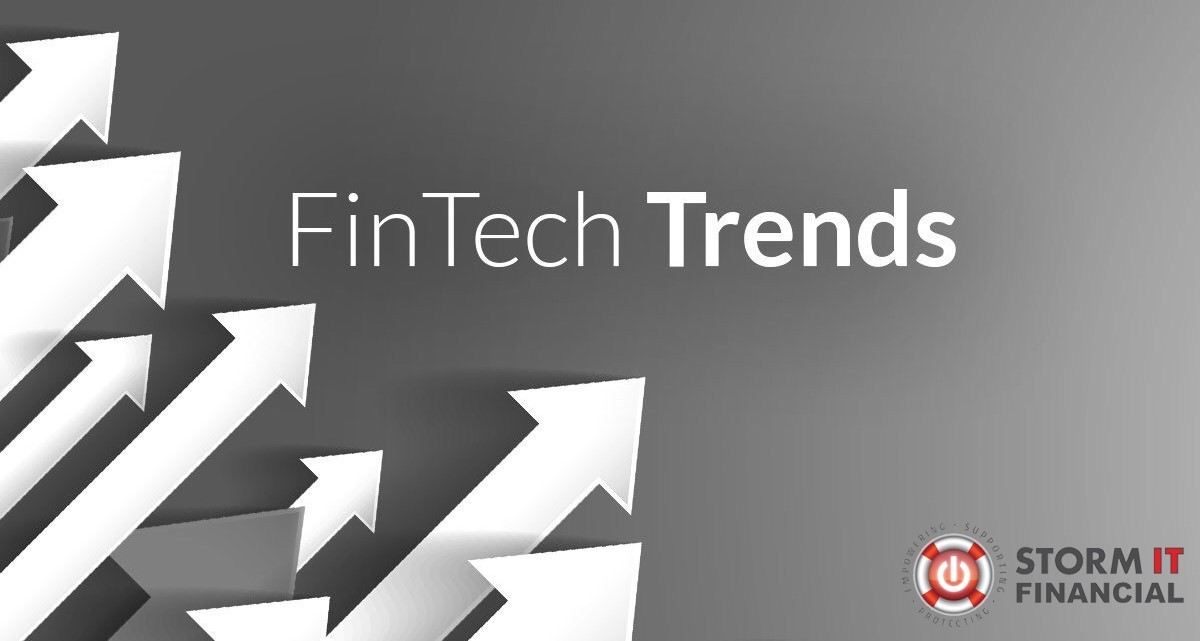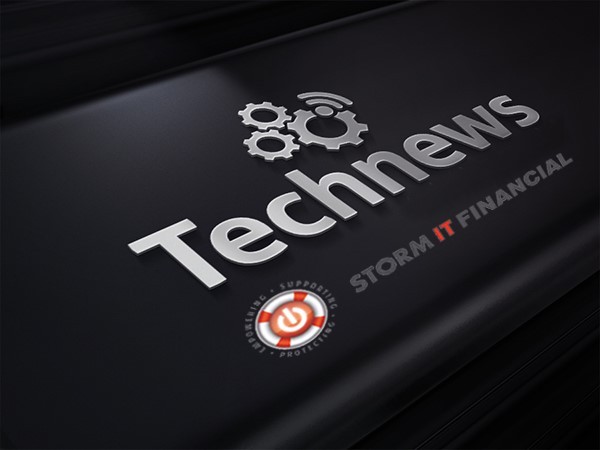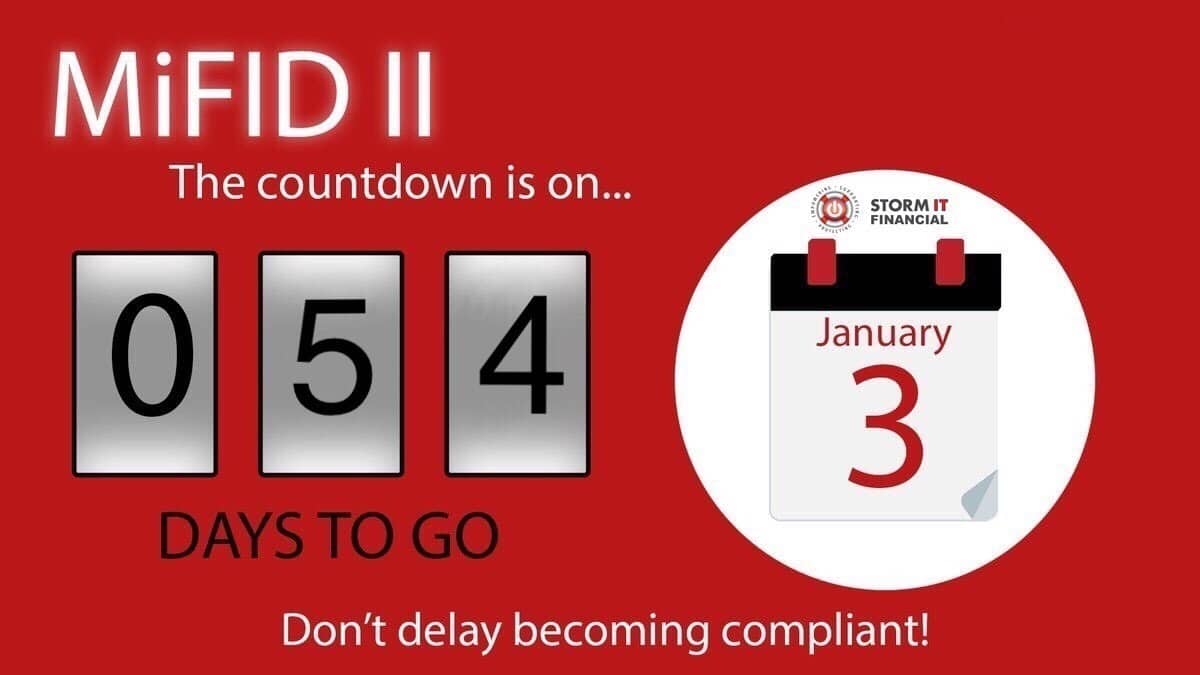FinTech Trends Newsletter Week 6th November – 10th November 2017

The MiFID II implications for Alternative Investment Managers

MiFID II is due to come into force in 54 days time, on 3rd January 2018. Understanding MiFID II and making appropriate preparations, is essential for alternative investment managers trading in London and the EU.
MiFID II (The Markets in Financial Instruments Directive) framework, which was originally applied to the UK in 2007, is being replaced by MiFID II on 3rd January 2018. MiFID II will have implications for any alternative investment managers who trade financial instruments in the EU. Storm IT Financial will try to help firms seek an understanding of MiFID II, its implications and considerations that should be made in the next 54 days and before, the 3rd January 2018.
Original MiFID : Has been in force since 2007 and was the EU’s legislation for regulating firms dealing with financial instruments such as shares, bonds, units in collective investment schemes, and derivatives. MiFID was intended to improve the competitiveness of EU financial markets by creating a single market for investment services and protecting investors. MiFID II extends the scope of the existing MiFID legislation, following developments in the decade since MiFID was released and especially in light of the 2008 financial crisis.
MiFID II will have a profound effect on how regulated firms carry out their business. But what about how they manage their IT systems?
Storm IT Financial deliver IT infrastructure and support services to alternative investment managers. We understand the importance of preparing IT systems for MiFID II and we are actively working with our clients to ensure that, come 3rd January 2018, they are prepared for the new regulations. When it comes to your IT systems, the following considerations need to be taken into account:
Voice Recording
Along with electronic correspondence, MiFID II will require that firms retain recordings of calls if they relate to transactions on both landline and mobile phones, even if they do not ultimately execute. If your firm does not record and store copies of calls through an effective voice recording system that covers mobile phones as well as landlines, you will need to implement appropriate measures to address this in preparation for 3rd January 2018.
Data Storage
As part of MiFID II’s investor protection and supervisory power objectives, alternative investment managers will need to keep copies of all communications relating to client orders. This will increase the amount of data that firms will be retaining. With a minimum
retention period of 5 years for client data and 7 years for regulator data, your firm should consider its backup & retention policies and whether they meet MiFID II’s requirements. Storage costs will also be a consideration, especially firms who transact high volumes.
Data Recording and Transaction Reporting
A fundamental requirement of the MiFID II framework is the ability to reconstruct events. Put simply, your firm will need to be able to accurately reconstruct events as firms are required to provide all data evidence relating to an FCA investigation to be readily available within 72 hours of a request by the regulator – whether or not trades and deals were executed – from all sources that exist in your firm’s different multiple platforms. This will mean the 4 R’s, Recording, Retaining, Reconstruction & retrieving Resilient data from fixed line calls and mobiles, emails, files in your system storage, instant messaging, and of course your PMS, OMS, and EMS.
Are your systems capable of reconstructing and reporting on this information quickly and easily? In order to prepare for MiFID II, your systems will need to record and store transaction data in a manner that enables rapid responses to regulator requests. This will need to be budgeted for, and your vendors’ SLAs will need to be aligned to regulators’ requirements.
MiFID II is being introduced on the 3rd January 2018 will have consequences for the way in which your firm and your IT managed services provider manages its IT systems. Understanding MiFID II is the first step towards putting in place the necessary systems and processes to meet the new requirements. Cont act Storm IT Financial for help and guidance about MiFID II and it’s effects on your firm, our MiFID II Call Recording & Data Compliant Solut ion s and how you can align your IT systems to the directive’s requirements.

Storm IT Financial FinTech News & Trends picks: Week 6th November – 10th November 2017
AI: Not All About Alpha
The buyside generally has a poor track record of adopting new technolo- gies & artificial intelligence looks to be the latest entry on a long list:
http://marketsmedia.com/ai-alpha/
Robots won’t destroy all the jobs because someone has to service the robots
Each new robot in the workplace can replace roughly six human workers, according to the National Bureau of Economic Research:
Will fund managers be replaced by machines? Canada launches first AI-run ETF
Even as we come to terms with robots taking away blue-collar jobs, Canada’s first AI exchange-traded fund shows that even white collar jobs may no longer be a safe bet:
Scrambling on MiFID? Don’t Forget a Coming Benchmark Change
MiFID II already consuming time, resources at compliance units:
US asset owners warn Mifid II creates uneven playing field
NYC pension and Colorado state want EU research regulations rolled out across America:
https://www.ft.com/content/472283e2-befb-11e7-9836-b25f8adaa111
Cybersecurity regulation shows no signs of slackening – KPMG
The Financial Stability Board (FSB) has published a stocktake of financial sector cybersecurity regulations, guidance and supervisory practices:
Why artificial intelligence is the next evolution in portfolio management – Video
Steve Hawkins, president and co-CEO of Horizons ETFs, talks about the launch of MIND ETF, Canada’s first ETF that uses artificial intelligence in all its investing decisions.
With Two Months to Go, U.S. Faces ‘Mad Dash’ to Adjust to MiFID
For thousands of brokers, traders and money managers based in the U.S., time is running out:
Scrutiny of corporate behaviour increases – KPMG
Aim of the Guidelines is to ensure sound governance arrangements in investment firms, in line with MiFID II:
Brussels financial directives have no interest in helping London
Outcome of EU regulation is complexity and compliance costs outweighing customer gains:
World’s First AI-Run Global ETF Makes Its Own Managers Nervous
The first global equity ETF run by robots made its trading debut, lacking the human touch:
Hong Kong regulator tells online trading firms to implement two-factor authentication by April 2018
New guidelines require all HK licensed or registered entities engaged in online trading to….:

